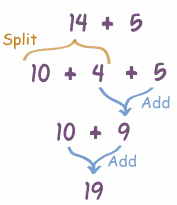There are lots of "thinking tricks" you can use to make it easier to add numbers.
Use the ones that make sense to you!
Count From A Number Upwards
Example: 6 + 3 |  |
Think "6 ... 7, 8, 9" |
Hint: start from the larger number
| Example: 2 + 6 | |||||||||
|
Jump Strategy
You can also count by 2s or 10s, or make any "jumps" you want to help you to solve a calculation.
Example: 4 + 12

Think "4 ... 14, 15, 16"
Adding Up To Ten
See if any of the numbers add up to 10. They don't have to be next to each other.
Example: 7 + 8 + 3 + 2 + 5
7+3 is 10,
8+2 is another 10, which makes 20,
Plus 5 is 25
Do The Tens Last
Break big numbers into Tens and Units, add the Units, then add on the Tens.
 | Example: 14+5 Break the "14" into Tens and Units: 10 + 4 Add the Units: 4 + 5 = 9 Now add the Tens: 10 + 9 = 19 Think "4 plus 5 is 9, plus 10 is 19" |
Another Example: 14 + 12
Break into Tens and Units: 10 + 4 + 10 + 2
Add the Units: 4 + 2 = 6
Now add on the Tens: 6 + 10 + 10 = 26
Aim for Ten
If you can see that a number is close to ten, then break the other number up so you reach ten.
Example: 9 + 79 is only 1 away from 10 so take 1 from the 7: 9 + 1 + 6 and give it to the 9: 10 + 6 = 16 | |
| Think "9 plus 1 is 10 ... 7 less 1 is 6, together is 16" | |
Another Example: 8 + 5
8+2=10, so lets take 2 from the 5: 8 + 2 + 3
and give it to the 8: 10 + 3 = 13
and give it to the 8: 10 + 3 = 13
You can even move backwards to ten, by making the other number bigger as needed:
Example 12 + 7 = 12 - 2 + 9 = 10 + 9 = 19
Double when the numbers are the same
Example 5 + 5 = 2 x 5 = 10
Double if the numbers are close, then fix
Example: 5 + 6 is nearly two 5s, but 6 is 1 bigger than 5, so:
5 + 6 = two 5s + 1 = 10 + 1 = 11
5 + 6 = two 5s + 1 = 10 + 1 = 11
Example: 7 + 9 is like two 8s, but 7 is 1 smaller than 8, and 9 is 1 bigger than 8 ... hey! it is exactly two 8s because 1 smaller and 1 bigger cancel each other:
7 + 9 = "8 less 1" + "8 add 1" = two 8s = 16
No comments:
Post a Comment